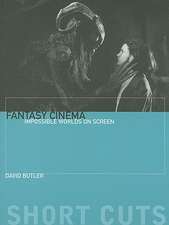Poitier Revisited: Reconsidering a Black Icon in the Obama Age
Editat de Ian Gregory Strachan, Mia Masken Limba Engleză Paperback – 18 mai 2016
| Toate formatele și edițiile | Preț | Express |
|---|---|---|
| Paperback (1) | 257.97 lei 43-57 zile | |
| Bloomsbury Publishing – 18 mai 2016 | 257.97 lei 43-57 zile | |
| Hardback (1) | 774.86 lei 43-57 zile | |
| Bloomsbury Publishing – 14 ian 2015 | 774.86 lei 43-57 zile |
Preț: 257.97 lei
Preț vechi: 331.42 lei
-22% Nou
Puncte Express: 387
Preț estimativ în valută:
49.36€ • 51.67$ • 41.09£
49.36€ • 51.67$ • 41.09£
Carte tipărită la comandă
Livrare economică 31 martie-14 aprilie
Preluare comenzi: 021 569.72.76
Specificații
ISBN-13: 9781501319822
ISBN-10: 1501319825
Pagini: 288
Ilustrații: 25 bw illus
Dimensiuni: 152 x 229 x 23 mm
Greutate: 0.39 kg
Ediția:NIPPOD
Editura: Bloomsbury Publishing
Colecția Bloomsbury Academic
Locul publicării:New York, United States
ISBN-10: 1501319825
Pagini: 288
Ilustrații: 25 bw illus
Dimensiuni: 152 x 229 x 23 mm
Greutate: 0.39 kg
Ediția:NIPPOD
Editura: Bloomsbury Publishing
Colecția Bloomsbury Academic
Locul publicării:New York, United States
Caracteristici
Ground-breaking method of wedding cinema studies, African American studies, cultural studies, and masculinity studies
Notă biografică
Ian Gregory Strachan is Associate Professor of English at the College of The Bahamas. He is the author of Paradise and Plantation: Tourism and Culture in the Anglophone Caribbean (2002), and recently co-edited an issue of the University of Miami's journal of Caribbean studies, Anthurium dedicated to Bahamian literature. He has also recently contributed a chapter to Routledge's forthcoming anthology Black Cinema Reconsidered entitled "The Measure of Men: Legacies of Sidney Poitier's A Piece of the Action." Mia Mask is Associate Professor of Film at Vassar College, USA, where she teaches courses on African American cinema, documentary film history, celebrity and power, and seminars on special topics. She also teaches feminist film theory, African national cinemas, and genre courses. She is the author of Divas on Screen: Black Women in American Film and the editor of Contemporary Black American Cinema. She has written film reviews and covered festivals for IndieWire.com, The Village Voice, Film Quarterly, Time Out New York, and The Poughkeepsie Journal. Her criticism was anthologized in Best American Movie Writing, 1999. Her scholarly essays are published in the African American National Biography, Screen Stars of the 1990s, Film and Literature, and American Cinema of the 1970s. She is on the editorial board of The Black Scholar. Her cultural commentary has been heard on National Public Radio.
Cuprins
List of FiguresAcknowledgementsNotes on ContributorsIntroduction1 Walking with Kings: Poitier, King, and Obama Aram Goudsouzian, University of Memphis, USA2 Historicizing the Shadows and Acts: No Way Out and the Imagining of Black Activist Communities Ryan De Rosa, Los Angeles Public Schools, USA3 Caribbean All-Stars: Sidney Poitier, Harry Belafonte, and the Rise of the African-American Leading Man Belinda Edmondson, Professor of English and African-American & African Studies, USA4 "Draggin' the Chain": Linking Civil Rights and African American Representation in The Defiant Ones and In the Heat of the NightEmma Hamilton and Troy Saxby, University of Newcastle, Australia5 Whisper Campaign on Catfish Row: Sidney Poitier and Porgy and Bess Jeff Smith, University of Wisconsin-Madison, USA6 To Sir, With Love: A Black British PerspectiveMark Christian, Lehman College, USA 7 Transgression or Legal Union?: The Meaning of Interracial Marriage in 1967 Film and LawKim Warren, University of Kansas, USA8 A Blues the Tom: Sidney Poitier's Filmic Sexual IdentitiesIan Gregory Strachan, College of The Bahamas, Bahamas9 Black Masculinity on Horseback: From Duel at Diablo to Buck and the Preacher and beyondMia Mask, Vassar College, USA10 Stepping Behind the Camera: Sidney Poitier's Directorial CareerKeith Corson, Rhodes College and Memphis College of Art, USA11 No Shafts, Super Flys, or Foxy Browns: Sidney Poitier's Uptown Saturday Night as Alternative to Blaxploitation Cinema"Novotny Lawrence, Southern Illinois University-Carbondale, USA12 Transcending Paul Poitier: Six Degrees of Separation and the Construction of Will SmithWillie Tolliver, Jr., Agnes Scott College, USA
Recenzii
Unlike much work on Poitier ... this volume [puts] the star in international context. Given Poitier's own international, cosmopolitan identity, such consideration is crucial, and Poitier Revisited does useful work in providing it.
With Poitier Revisited Ian Gregory Stachan and Mia Mask present a well-curated collection of essays about Hollywood's first Black leading man. Each separate contribution provides an original interpretation of a complex man, performer, and political icon, while the collection as a whole comes together in thoughtful harmony. In all, Poitier Revisited is an important addition to a woefully under-represented figure in film studies.
This is a comprehensive, sophisticated anthology, exploring every nuance of Poitier's incredible 'star' trajectory: from Hollywood's 'social problem' films through his Oscar wins and directorial triumphs... and well beyond. One must read it as one of the ur-texts of 'Poitier star studies' as well as black cinema studies and much more.
Strachan (College of the Bahamas) and Mask (Vassar College) have gathered work by North American, Caribbean, and European scholars representing a variety of disciplines-including history, sociology, and cinema studies. The contributors provide a range of perspectives on an iconic actor who, in terms of scholarship, is 'frozen somewhere between 1963 and 1967' (according to the introduction). In resurrecting Poitier and repositioning him in contemporary film studies, the essays cover a range of topics. As a political icon, Poitier is examined in relation to Martin Luther King, Jr. and Barack Obama; other essays explore Poitier's singular roles in films such as No Way Out, The Defiant Ones, In the Heat of the Night, Porgy and Bess, To Sir with Love; the implications of interracial marriage presented in Guess Who's Coming to Dinner; the actor's contributions to the Western genre; his directorial legacy (e.g., Uptown Saturday Night and Let's Do It Again); and his construction, through the characterization of the protagonist (played by Will Smith), in Six Degrees of Separation. Long overdue, this volume critiques Poitier in all of his complexity, addressing how Poitier laid the foundation for later representations of black masculinity. Summing Up: Highly recommended. All readers.
With Poitier Revisited Ian Gregory Stachan and Mia Mask present a well-curated collection of essays about Hollywood's first Black leading man. Each separate contribution provides an original interpretation of a complex man, performer, and political icon, while the collection as a whole comes together in thoughtful harmony. In all, Poitier Revisited is an important addition to a woefully under-represented figure in film studies.
This is a comprehensive, sophisticated anthology, exploring every nuance of Poitier's incredible 'star' trajectory: from Hollywood's 'social problem' films through his Oscar wins and directorial triumphs... and well beyond. One must read it as one of the ur-texts of 'Poitier star studies' as well as black cinema studies and much more.
Strachan (College of the Bahamas) and Mask (Vassar College) have gathered work by North American, Caribbean, and European scholars representing a variety of disciplines-including history, sociology, and cinema studies. The contributors provide a range of perspectives on an iconic actor who, in terms of scholarship, is 'frozen somewhere between 1963 and 1967' (according to the introduction). In resurrecting Poitier and repositioning him in contemporary film studies, the essays cover a range of topics. As a political icon, Poitier is examined in relation to Martin Luther King, Jr. and Barack Obama; other essays explore Poitier's singular roles in films such as No Way Out, The Defiant Ones, In the Heat of the Night, Porgy and Bess, To Sir with Love; the implications of interracial marriage presented in Guess Who's Coming to Dinner; the actor's contributions to the Western genre; his directorial legacy (e.g., Uptown Saturday Night and Let's Do It Again); and his construction, through the characterization of the protagonist (played by Will Smith), in Six Degrees of Separation. Long overdue, this volume critiques Poitier in all of his complexity, addressing how Poitier laid the foundation for later representations of black masculinity. Summing Up: Highly recommended. All readers.









